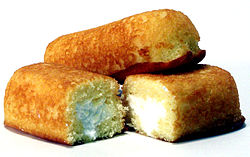vacations and twinkies

Alternet has a great article on the differences in vacation between Europe and America.
Shorter vacations, longer work weeks and skimpy sick leave for Americans add up -- not to greater upward mobility, but to a burned-out workforce earning less than preceding generations.
Another article in alternet is on the industry that produces twinkies, the archetype of processed foods.
On a personal note, we used to read Archie Comics growing up, and at the back there was a section on twinkies and hostess cupcakes. We had never seen or eaten junk food like that, so were always fascinated about what these appetizing images tasted like.
So, I know that certain foods are linked to certain places. What's appealing to me about Twinkie, Deconstructed is that processed foods, by their very definition, are not linked to any place. They're anti-linked, they're meant to be producible everywhere and always the same. So, it was intriguing to see where the opposite of the, let's say, Belgian beer, comes from. The answer is that it doesn't come from any particular place. That's actually the nut of the whole book.
Petrovic: Are there any ingredients you found to be particularly disturbing or disgusting?
Ettlinger: Well, I didn't find any to be disgusting, but I think I've been fascinated with polysorbate 60 for a couple of reasons. One reason is my daughter's infamous question. Secondly, it is such an unfood-like sounding thing, not that mono and diglycerides sound appetizing, but there's something about polysorbate 60 that sounds so chemical that I just had to check it out. You know, "Why am I eating this thing?" Also, it largely replaces egg yolks, which are a wonderful food. I like making sauces, I used to live in France, so egg yolks are ... to think of an industrial version of that is sort of funny for me.
Also, one of my sources sent me a sample of polysorbate 60, a large quart container of this light brown goo, and I asked, "Can I taste it?" He said, "You wouldn't want to; you won't be able to taste your dinner for a week." That kind of scared me. No one else sent me a sample and said, "Don't taste it." Obviously, something like flour, you won't be happy if you stick your finger in it and lick it.
Petrovic: This is a question that you yourself ask in your book -- why do we make such an enormous industrial effort to create artificial replacements for relatively unprocessed things like sugar, butter or vanilla?
Ettlinger: I think mankind is driven to always improve on nature or try to control it. In this case the motivation comes from mankind's desire to preserve food, which goes back thousands of years to smoking and salting. And what the food chemists who have created a cake with a long shelf life have done is sort of in the tradition of salting your fish or smoking your pork so it will last.

Comments